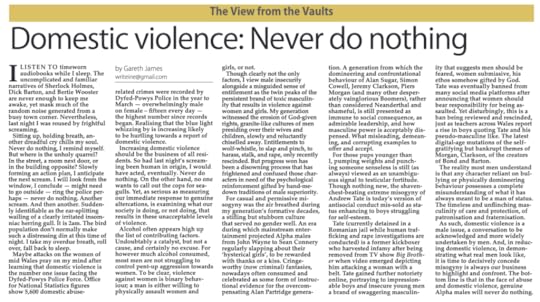Never do Nothing
 (Published
Cambrian News
(print editions) 11 January 2023)
(Published
Cambrian News
(print editions) 11 January 2023)I listen to timeworn audiobooks while I sleep. The uncomplicated and familiar narratives of Sherlock Holmes, Dick Barton, and Bertie Wooster are never enough to keep me awake, yet mask much of the random noise generated from a busy town corner. Nevertheless, last night I was roused by frightful screaming.
Sitting up, holding breath, another dreadful cry chills my soul. Never do nothing, I remind myself. But where is the unholy quarrel? In the street, a room next door, or in the building opposite? Slowly forming an action plan, I anticipate the next scream. I will look from the window, I conclude – might need to go outside – ring the police perhaps – never do nothing. Another scream. And then another. Suddenly identifiable as the ear-splitting wailing of a clearly irritated insomniac herring gull. It is 2am. The bird population don’t normally make such a distressing din at this time of night. I take my overdue breath, roll over, fall back to sleep.
Maybe attacks on the women of mid Wales pray on my mind after learning that domestic violence is the number one issue facing the Dyfed-Powys Police Force. Office for National Statistics figures show 5,600 domestic abuse-related crimes were recorded by Dyfed-Powys Police in the year to March – overwhelmingly male on female – fifteen every day – the highest number since records began. Realising that the blue light whizzing by is increasing likely to be hurtling towards a report of domestic violence.
Increasing domestic violence should be the business of all residents. So had last night’s screaming been human in origin, I would have acted, eventually. Never do nothing. On the other hand, no one wants to call out the cops for seagulls. Yet, as serious as measuring our immediate response to genuine altercations, is examining what our society is doing, or not doing, that results in these unacceptable levels of violence.
Alcohol often appears high up the list of contributing factors. Undoubtably a catalyst, but not a cause, and certainly no excuse. For however much alcohol consumed, most men are not struggling to control pent-up aggression towards women. To be clear, violence against women is binary behaviour; a man is either willing to physically assault women and girls, or not.
Though clearly not the only factors, I view male insecurity alongside a misguided sense of entitlement as the twin peaks of the persistent brand of toxic masculinity that results in violence against women and girls. My generation witnessed the erosion of God-given rights, granite-like cultures of men presiding over their wives and children, slowly and reluctantly chiselled away. Entitlements to wolf-whistle, to slap and pinch, to harass, stalk, and rape, only recently rescinded. But progress won has been a disowning process that has frightened and confused those characters in need of the psychological reinforcement gifted by hand-me-down traditions of male superiority.
For casual and permissive misogyny was the air breathed during my generation’s formative decades, a stifling but stubborn culture that served no gender well. An era during which mainstream entertainment projected Alpha males from John Wayne to Sean Connery regularly slapping about their ‘hysterical girls’, to be rewarded with thanks or a kiss. Cringeworthy (now criminal) fantasies, nowadays often consumed and celebrated as some form of instructional evidence for the overcompensating Alan Partridge generation. A generation from which the domineering and confrontational behaviour of Alan Sugar, Simon Cowell, Jeremy Clarkson, Piers Morgan (and many other desperately vainglorious Boomers), rather than considered Neanderthal and shameful, is still presented as immune to social consequence, as admirable leadership, and how masculine power is acceptably dispensed. What misleading, demeaning, and corrupting examples to offer and accept.
For those pups younger than I, pumping weights and punching someone senseless is still (as always) viewed as an unambiguous signal to testicular fortitude. Though nothing new, the shaven-chest-beating extreme misogyny of Andrew Tate is today’s version of antisocial conduct mis-sold as status enhancing to boys struggling for self-esteem.
Tate (currently detained in a Romanian jail while human trafficking and rape investigations are conducted) is a former kickboxer who harvested infamy after being removed from TV show Big Brother when video emerged depicting him attacking a woman with a belt. Tate gained further notoriety online, portraying to impressionable boys and insecure young men a brand of swaggering masculinity that suggests men should be feared, women submissive, his ethos somehow gifted by God. Tate was eventually banned from many social media platforms after announcing that women should bear responsibility for being assaulted. Yet disturbingly, this is a ban being reviewed and rescinded, just as teachers across Wales report a rise in boys quoting Tate and his pseudo-masculine like. The latest digital-age mutations of the self-gratifying but bankrupt themes of Morgan, Clarkson, of the creators of Bond and Barton.
The reality most men understand is that any character reliant on bullying or physically domineering behaviour possesses a complete misunderstanding of what it has always meant to be a man of status. The timeless and unflinching masculinity of care and protection, of patronisation and fraternisation.
As such, domestic violence is a male issue, a conversation to be acknowledged and more widely undertaken by men. And, in reducing domestic violence, in demonstrating what real men look like, it is time to decisively concede misogyny is always our business to highlight and confront. The bottom line is that in the face of abuse and domestic violence, genuine Alpha males will never do nothing.



